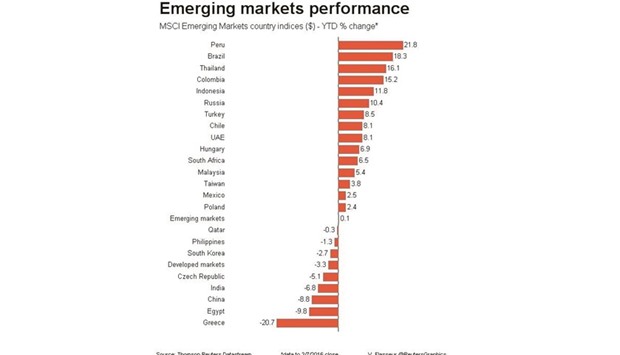Emerging market stocks retreated from 10-week highs yesterday after export numbers from China fell, whilst a significant widening of South Africa’s current account deficit pushed the rand more than 1% lower.
MSCI’s benchmark emerging equity index fell 0.65%, snapping a seven-day winning streak after China’s February trade data showed exports falling 25.4% year-on-year, the biggest drop since May 2009.
“There is a bit of a pullback and the China numbers overnight have probably contributed to that,” said Manik Narain, emerging markets strategist at UBS.
He added that the market could be taking a tactical break ahead of Thursday’s European Central Bank meeting to see if it will meet expectations for the risk rally to continue.
Chinese mainland shares closed marginally up, but Hong Kong stocks lost 0.7%.
The mood was more bullish in central Europe due to expectations of more ECB easing, and Budapest’s equity index leapt to a six-year high, led by its biggest lender OTP Bank.
Bank stocks also rose in Warsaw, including Pekao and Alior which sources say is in talks to buy its rival Bank BPH from General Electric. The broader index was 0.5% lower however.
The South African rand lost over 1% against the dollar after the current account deficit widened to 5.1% of GDP in the fourth quarter, much bigger than economists’ expectations for a 4.35% gap.
William Jackson, senior EM economist, said this highlighted the country’s external vulnerabilities. “There’s little sign so far that the weakness of the rand has boosted exporters,” he added, referring to the currency’s 30%-plus loss against the dollar since mid-2013.
The Russian rouble retreated 0.6% from 2016 highs hit on Monday as oil prices edged lower after Kuwait said it would only agree to an output freeze if all major producers take part. Russian local markets are shut for a holiday.
But Brent crude is still holding above $40 a barrel after Monday’s 5.5% surge but Goldman Sachs has poured cold water over the prospects for a sustained rally.
The Hungarian forint fell more than 1% to the euro after January trade surplus and February consumer inflation came in below forecast, cementing expectations of more policy easing.
The Czech crown firmed a touch however on a continued improvement of the trade surplus in January.
The Turkish lira eased 0.2%, despite a stronger-than-expected 5.6% rise in industrial production in January.

EME
